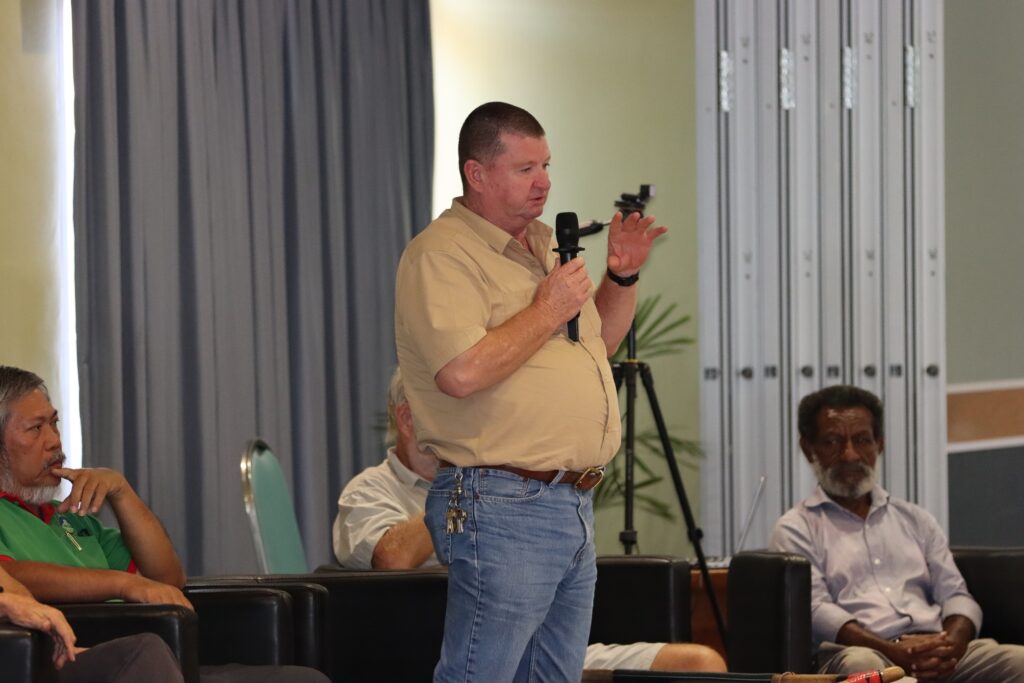LAE, Wednesday, April 9, 2025 — Papua New Guinea’s homegrown beef industry—one of the few in the Pacific that raises, processes, and consumes all its beef domestically—is facing mounting challenges that could cripple its growth, a leading industry figure has warned.
Speaking during the National Agriculture Industry Public-Private Sector Partnership Conference held in Lae on Wednesday, April 9, John Smith, Head of Beef at Ramu Agri Industries Ltd, sounded the alarm on worsening roads at Mutzing in the Markham Valley, unreliable electricity, and insecure land access, all of which are undermining the sector’s ability to feed the nation.
“Everything we produce—every kilogram—is grown, processed, and sold here in PNG,” Smith said. “This is a truly homegrown industry. But it’s hanging by a thread due to systemic infrastructure failure.”
Beefing Up PNG from Within
Ramu Agri, through its Ramu Beef and Numundo Beef divisions, currently maintains an average of 24,000 head of cattle year-round and produces close to 2 million kilograms of beef annually—a dramatic increase from 700,000 kilograms just 11 years ago.
“We are a fully integrated operation. We breed, rear, fatten, process, and distribute our own beef,” Smith told delegates. “We feed our cattle in two 2,000-head feedlots, process them at our own abattoirs, and deliver straight to markets across PNG—from supermarkets like RH Trading and Rangeview to major hotels and small retailers.”
With no imports or exports involved, Ramu Agri’s supply chain is uniquely national. “You walk into a supermarket or hotel in Port Moresby, Lae, or even the islands, and chances are you’re eating our beef,” Smith said.
Power Supply a Risk to National Food Security
However, this national pride is now under pressure. Smith highlighted power reliability as the most urgent threat to the company’s cold chain operations.
“At any time, we’re storing up to 3 million kilos of beef. That’s product that must be kept chilled or frozen constantly,” he said. “But we’re dealing with blackouts almost every week. So we’ve had to invest in backup generators, and now backup generators for the backup generators.”
Running on diesel is expensive—and risky. “One power failure for just two hours could mean losing an entire container load of beef worth hundreds of thousands of kina,” Smith said. “We’re not just feeding our customers—we’re protecting national food security.”
Poor Roads Blocking National Beef Distribution
Smith also zeroed in on the crumbling state of the Highlands Highway at Mutzing in the Markham Valley, a key artery for moving beef from Ramu to the rest of the country.
Ramu Agri’s supply chain disruptions were laid bare this week when a major shipment of beef was forced to turn back due to poor road conditions near Mutzing.
The blocked road meant that a delivery tonnes of chilled beef—valued at hundreds of thpusands of kina—could not proceed. Smith said the financial loss was immediate and unrecoverable, highlighting how fragile logistics remain for agribusiness operators in the country.
The logistical chain from farm to port and then to major markets is a delicate balance. “We stop at midpoints to plug in containers, check refrigeration, load onto ships, and move it to Pom. Each step is another risk point, another cost,” Smith explained. “Bad roads just make everything worse.”

John Smith, Head of Beef at Ramu Agri Industries Ltd, addressing the conference.-Picture by Department of Agriculture Media
Land Access: The Next Bottleneck
Ramu Agri leases most of its cattle-grazing land from local communities across Usino Bundi and the Markham Valley, engaging with about 15,000 landowners. But tenure remains insecure.
“Often we lease land one year, lose it the next, then lease it again,” said Smith. “It’s difficult to expand production when you don’t know if you’ll have access to the land next season.”
Some of their land partnerships have lasted over two decades, but many others are short-term. Smith stressed the importance of trust and communication in building stable land partnerships. “This is not just about farming—it’s about long-term relationships.”
Rural Security: Trust over Fences
While security in rural PNG is often cited as a deterrent to investment, Smith said Ramu Agri’s approach has been to build community goodwill rather than physical barriers.
“We work with our neighbours, not around them. That’s the secret to security—being part of the community, not apart from it,” he said.
Agriculture Leading Development in Reverse
In closing, Smith reflected on PNG’s unique situation, where agriculture is expected to lead national development, rather than follow it.
“In Europe, the Industrial Revolution drew people off the land into cities, and then agriculture had to adapt. Here, we’re asking agriculture to be the engine that kickstarts everything else,” he said. “It’s a bold approach, but it comes with big risks.”
A Call for Immediate Action
Smith’s message was clear: if PNG wants to preserve and grow its domestic beef industry, it must urgently fix its roads, stabilise its electricity supply, and provide more certainty around land access.
“Papua New Guineans are feeding Papua New Guineans. That’s something to be proud of,” he said. “But unless the government acts now—this year, this month—we may lose it all.”
ENDS